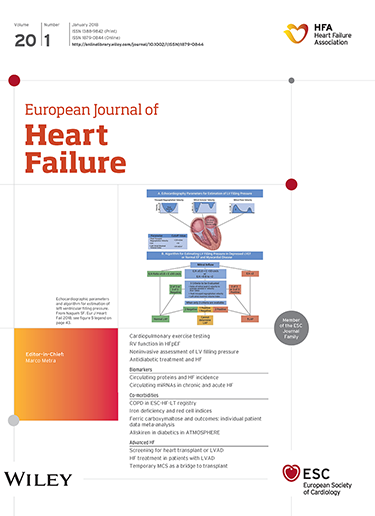Management of acute decompensated valvular heart disease
IF 16.9
1区 医学
Q1 CARDIAC & CARDIOVASCULAR SYSTEMS
引用次数: 0
Abstract
Worldwide, valvular heart disease (VHD) is a common cause of hospitalization for acute heart failure. In acute heart failure caused by VHD, symptoms result from rapid haemodynamic changes and subsequent decline in cardiac function, and if left untreated, leads to acute decompensation and cardiogenic shock. Current evidence remains scarce and recommendations regarding the management of acute heart failure caused by VHD are lacking in most recent international guidelines. Herein, we review the management of acute heart failure caused by VHD with a focus on transcatheter therapies and describe currently available evidence based on a systematic literature search on the following valve pathologies: (i) aortic stenosis, (ii) aortic regurgitation, (iii) mitral regurgitation, and (iv) mitral stenosis. Articles reporting outcomes following urgent or emergent valve intervention in the setting of cardiogenic shock or acute heart failure were considered. After screening a total of 2234 articles, 76 published between 1994 and 2023 were included in subsequent analysis. Based on available evidence, proposed treatment algorithms to guide optimal management of acute heart failure caused by VHD were created. As the number of patients presenting with acute heart failure caused by VHD continues to rise and outcomes following transcatheter valve interventions continue to improve, it is inevitable that minimally invasive options will play an increasingly important role in the acute setting, especially given these patients are at an increased operative risk. This review aims to present an organized approach to the complex management and interventional treatment of patients with acute heart failure caused by VHD.急性代偿性瓣膜性心脏病的治疗
在世界范围内,瓣膜性心脏病(VHD)是急性心力衰竭住院治疗的常见原因。在VHD引起的急性心力衰竭中,症状表现为血流动力学的快速改变和随后的心功能下降,如果不及时治疗,可导致急性代偿失代偿和心源性休克。目前的证据仍然缺乏,并且在最近的国际指南中缺乏关于VHD引起的急性心力衰竭管理的建议。在此,我们回顾了由VHD引起的急性心力衰竭的治疗,重点是经导管治疗,并根据系统的文献检索描述了目前关于以下瓣膜病理的可用证据:(i)主动脉瓣狭窄,(ii)主动脉瓣反流,(iii)二尖瓣反流,(iv)二尖瓣狭窄。文章报道了在心源性休克或急性心力衰竭的情况下紧急或紧急瓣膜干预的结果。在对2234篇文章进行筛选后,在1994年至2023年间发表的76篇文章被纳入后续分析。基于现有的证据,提出了治疗算法来指导VHD引起的急性心力衰竭的优化管理。由于出现VHD引起的急性心力衰竭的患者数量持续增加,经导管瓣膜介入治疗后的预后不断改善,微创治疗在急性心衰中不可避免地将发挥越来越重要的作用,特别是考虑到这些患者的手术风险增加。本文旨在为VHD引起的急性心力衰竭患者的复杂管理和介入治疗提供一种有组织的方法。
本文章由计算机程序翻译,如有差异,请以英文原文为准。
求助全文
约1分钟内获得全文
求助全文
来源期刊

European Journal of Heart Failure
医学-心血管系统
CiteScore
27.30
自引率
11.50%
发文量
365
审稿时长
1 months
期刊介绍:
European Journal of Heart Failure is an international journal dedicated to advancing knowledge in the field of heart failure management. The journal publishes reviews and editorials aimed at improving understanding, prevention, investigation, and treatment of heart failure. It covers various disciplines such as molecular and cellular biology, pathology, physiology, electrophysiology, pharmacology, clinical sciences, social sciences, and population sciences. The journal welcomes submissions of manuscripts on basic, clinical, and population sciences, as well as original contributions on nursing, care of the elderly, primary care, health economics, and other related specialist fields. It is published monthly and has a readership that includes cardiologists, emergency room physicians, intensivists, internists, general physicians, cardiac nurses, diabetologists, epidemiologists, basic scientists focusing on cardiovascular research, and those working in rehabilitation. The journal is abstracted and indexed in various databases such as Academic Search, Embase, MEDLINE/PubMed, and Science Citation Index.
 求助内容:
求助内容: 应助结果提醒方式:
应助结果提醒方式:


